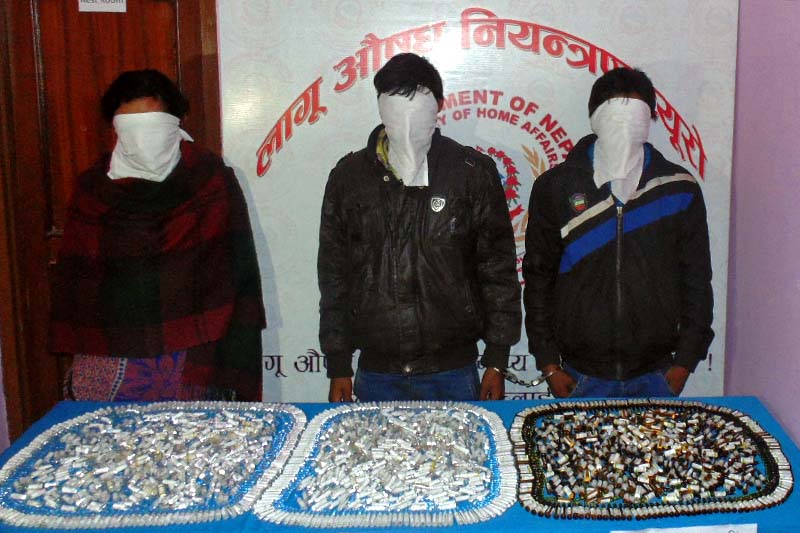16,717 drug traffickers booked in six years, shows NCB data
Kathmandu, February 26
Narcotics Control Bureau, the anti-drug agency of Nepal Police, said it arrested and initiated legal action against as many as 16,717 persons for their involvement smuggling and peddling drugs over a period of six years (2011-2016) across the country.
Of them, 15,942 are male and 775 female. They include 892 foreigners, including 808 Indian nationals. The arrest of drug traffickers is on upward trend annually despite slight drop in 2015. The statistics released by NCB show that 2,174 persons were arrested in 2011 against 2,600 in 2012, 2,673 in 2013, 2,918 in 2014, 2,656 in 2015 and 3,696 in 2016.
NCB seized 126,007 kg cannabis, 15,522 kg hashish, 50 kg heroin, 128 kg opium, 31.5 kg cocaine and 12,70,498 ampoules of controlled pharmaceutical drugs during the period. Prescription drugs are mainly diazepam, buprenorphine, norphin and phenergan. An NCB official claimed the proactive measures of the anti-drug agency led to the increase in the arrest of traffickers and seizure of narcotic drugs.
He warned that Nepal was on the verge of becoming a transit for international drug trade. Racketeers’ obsession with drug trafficking to third countries making Nepal a transit continues unabated. “People involved in drug smuggling seem to be ready to take the risk of arrests and jail as international rackets promise them hefty sums. Arrests and seizures are doing little to control drug smuggling. Racketeers working on the top layer have been selling dreams to their agents in Nepal and abroad. Growing demand for drugs is also to blame for the trend,” he reasoned.
The official underscored the need to raise awareness against drug abuse at local, regional, national and international levels. If the demand for drugs amongst users decreases, it will automatically discourage racketeers. The data shows smuggling of pharmaceutical drugs into Kathmandu Valley in recent times is on the rise.
Nepali and Indian traffickers are supplying prescription drugs to users through various channels. Racketeers have switched to pharmaceutical drugs from hardcore ones like cocaine and heroin.
People possessing narcotic drugs like hashish, heroin, opium and cocaine are liable to life imprisonment along with confiscation of property whereas those convicted of smuggling pharmaceutical drugs may get freedom after spending up to three years in jail as per the Narcotic Drug (Control and Punishment) Act.






